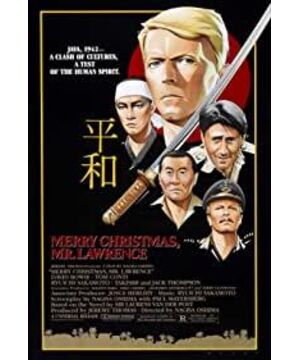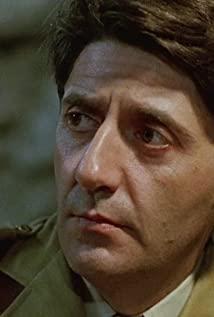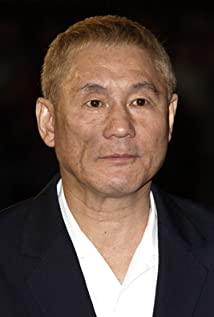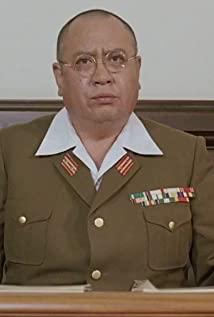The movie "Merry Christmas on the Field" depicts that during World War II, the Japanese army built a prisoner of war camp on the Indonesian island of Java, which was managed by officers along with Noi (played by Ryuichi Sakamoto) and Sergeant Hara (played by Takeshi Kitano). With the arrival of the handsome and unruly British prisoner of war Jack (David Bowie), the original order on the island is broken, and the relationship between officers and prisoners of war becomes delicate and complicated... This film mixes war and human nature, Taboo and love, guilt and redemption... The content is rich and profound, and the expression is subtle and obscure. After repeated viewing and comparison of the original work, the summary analysis is as follows.
1. The theme of the film is anti-war, revealing the wrongness of war by shaping the image of soldiers under Japanese militarism.
(1) A mindless war machine
The Japanese guards in the POW camps were loyal to the emperor, and they only talked about order. Regardless of right or wrong, they were cold and ruthless.
Former Sergeant. He sacrificed his life to the emperor at the age of seventeen when he worshipped the temple. A person without life naturally has no thoughts and feelings. Some are just obedience to orders and cruelty to prisoners of war.
with Noi. He is a noble-born young officer, serious and introverted, handsome and elegant, and has a high cultural quality. It was not until he met Jack, the "evil spirit", that emotional sparks ignited in his heart, but his concept made him unable to face up to this emotion, blindly suppressed it, and fell into pain.
The orderly with Noi. He saw the change in Yonoi's heart, and he did not hesitate to use Bushido's "down-to-up" approach, sacrificing himself to remove "obstacles" for the superiors and maintain their unified war order.
What they have in common is that they regard the emperor as a god, and use the spirit of Bushido as their guideline.
(2) The belief concept of arrogance
The Japanese soldiers were proud of their beliefs. It was their national policy to hang the banners of "Hachiko Ichiyu" in the guard room. They asked the prisoners of war to visit the caesarean section to see the bravery of Bushido, but the cruel and bloody scenes were met by the prisoners of war. Protesting, Yunoi was very angry, and initiated a Japanese-style fasting practice to reflect, this inexplicable activity in the eyes of the prisoners of war was destroyed by Jack... The director wants to express that the "correct thinking" that the Japanese are proud of is in the West. The world is not recognized.
(3) The painful price of collective madness
The film reflects on and exposes the inferiority of the Japanese nation, for which the director skillfully draws on the Western perspective and expresses it in the words of Lawrence. During the confinement, Lawrence said to Jack: "The Japanese nation is a worried nation. They cannot do things individually and need collective action, so it is easy to go mad collectively." This reveals that the Japanese lack individual consciousness, and war is their collective madness. At the funeral of the orderly, Lawrence cursed loudly: "It was your god who made you become like this, the goddamn god!" and rushed up to smash the shrine angrily, criticizing their inner beliefs. At the end of the film, the former sergeant who became a prisoner asked Lawrence on the eve of the execution: "I did my duty as a soldier, like other soldiers, why was I sentenced to death? What did I do wrong?" Lawrence said: "You and Yunoi Captains, like them, are all victims of those who think they are right." It reveals the essence of war and the sadness of soldiers. They are just victims of war, and those who believe in war finally pay a painful price.
2. About human nature
Humanity is an issue that the film focuses on. War tramples on human nature, but it cannot destroy human nature. Prisoner-of-war camps are full of beatings, insults, punishments and killings. The cramped space, dense crowds, and oppressive atmosphere cannot prevent the undercurrent of human nature from growing and surging in the dark. The monotonous island background magnifies the entanglement of human nature, and the sound of heartbreak can be heard in the far distance of the war. Human nature takes its own form in different relationships.
First, in the relationship between Jin Ben and Derong at the beginning of the film, human nature is shown as their same-sex behavior. They were humiliated by the former sergeant. Because De Jong did not dare to admit it, Jin Ben was executed, and De Jong also committed suicide by biting his tongue. This skimpy plot provides the entire film with a hint of homosexuality and an atmosphere of taboo.
The second is that in the relationship between the former sergeant and Lawrence, human nature is expressed in their friendship across positions. Lawrence, who can speak Japanese, is familiar with Sergeant Yuan, and occasionally exchange views with each other. In addition, the ruthless former sergeant still added Lawrence sticks on a daily basis, and in order to comply with the commander's will, he also made him a scapegoat for the "radio incident" and decided to execute him.
But the situation reversed at Christmas. That night, the former sergeant got drunk while on duty, claimed to be Santa Claus, and released Lawrence and Jack without authorization. In the end, he wished him a Merry Christmas in broken English! When he shouted "Merry Christmas Mr. Lawrence!", he showed a rare simplicity and sincerity. This is one of the few happy plots in the whole movie, warm and moving. It tells the title and reveals the connotation of the movie: there is still a happy Christmas in the cruel battlefield, and the hostile position also shows the precious friendship.
The third is that between Noi and Jack, the expression of human nature takes spirit as the content and redemption as the sublimation of same-sex feelings.
At the military court, Yunoi was attracted by Jack's handsome appearance and brave and unyielding military bearing. He fell in love at first sight. He did not want this beautiful life to be sent away by a hasty trial judgment. , using Shakespeare's sentence to imply the key to his case, Jack, who has been a lawyer, naturally understands... The first confrontation, they saw each other's beauty, grace and wisdom, and formed a subtle tacit understanding. After Yunoi rescued Jack, he took him to his prisoner of war camp and took care of him everywhere. His love for Jack continued to grow wildly, but his beliefs and ideas prevented him from facing up to his sinful feelings. His heart was tortured, and he went to visit his beloved every night, but only stopped to look.
For Jack, it was beautiful at first sight. The young and handsome officer saved his life. He remembered the way Noi looked into his eyes in the courtroom, asked his name, and remembered his voice. While practicing swordsmanship with Noi and roaring, he asked Lawrence with concern: "Is that the voice of Captain Noi? I think he has something on his mind, we may be in the same boat." They are two birds who admire each other's beautiful feathers , and faintly felt inside. Jack knew Yu Noi's special care for him, but he was not sure of Yu Noi's true thoughts. After all, officers were used to silence.
Everything was confirmed on the night of the escape. When Jack escaped, he was confronted with Noi. Jack raised a knife to defend, and he confronted Noi with his knife. The moonlight was like water. Jack guessed that Noi and Noi would not hurt him, so he simply threw down the knife, a smile on the corner of his mouth, full of pampering. happy. At this time, Sergeant Yuan came and drew his gun to kill Jack (it can be seen that the crime of escape of the prisoners of war was serious). Everything is clearly announced. Jack buried his head deeply, as if he had been hit. At this moment, he knew that Yonoi really fell in love with him, and also knew the pain and grievances in his heart. What can be said? Sadness and joy. Having obtained true love in a cruel world, his hunch was right. In fact, he also loves Noi, otherwise he would not bow his head in pain and feel pain for the heart that loves him.
Nonoi doesn't know how Jack feels, he doesn't understand why Jack doesn't fight him: is he not brave enough? Still don't believe you can let him go? Still refuse to accept this friendship? In short, he felt extremely disappointed. Although they admire and adore each other, the war environment makes it difficult for them to communicate. I don't know about Junyue, and I don't know about you.
3. Love and redemption
Because of the same-sex love with Noi and Jack, some people label the film as gay, but the film does not discuss homosexuality, but develops a higher level of human redemption on this basis.
For a long time, Jack's heart had a kink that he couldn't let go of. Because of habit and vanity, he was coerced by a group, betrayed his beloved younger brother, and betrayed his inner love for his younger brother. This kind of betrayal tortured him and made him Lose the ability to love. He participated in the war and made many military exploits, but he couldn't get rid of the pain in his heart, because the real redemption is not to escape, but to face and follow his inner feelings.
Like Jack, and Noi also have a heart: he failed to participate in the "226" uprising with his companions, his companions were killed, and he was left alone in the world to die. When he met Jack, the seeds of love fell into his heart, like flowers blooming from thorns, blooming and dripping blood. Instead of saving him, the faith and spirit he turned to for help drove him to madness.
The moment of collapse has finally come. In order to fulfill the superior's order, Yonoi had to inspect all prisoners of war, and even hospitalized patients were driven to the sun. This scene is really sad: Captain Yonoi, who promised to eat whatever prisoners of war he eats, has already disregarded the life and death of prisoners of war; he who is strictly forbidden to beat prisoners of war, beats the prisoners with a cane in his hand; the leader of the prisoners of war respects him He saluted, and now he has raised his sword and started to kill...
Looking at the irrational Yonoi, Jack felt heartache, and their hearts were connected. Just as Yonoi raised his sword and prayed, Jack seemed to hear the call of his own will, calmly walked out of the queue, and walked towards Yonoi while sorting his clothes. This time, he is no longer the timid boy he used to be. He is going to help his younger brother out of family love; he is going to save his comrade-in-arms under the slaughtering knife out of military love; at this moment, he has to save him—— The affectionate young man who fell in love with himself, his confused soul, only his own love can bring it back to the world - that is his love too. When he does this, he will cut himself off from the collective, he will stand with his inner love, he will use love to connect with him, cut off from Noi and his crazy collective, and let him see himself , face up to your own feelings.
The flustered Yonoi didn't know what Jack was going to do. For the first time, he put his hand on his chest and tried to push him away. Without warning, Jack pulled Yonoi and put a deep kiss on his left and right cheeks. At this moment, their love finally answered each other like a flash. The love with Noi was finally seen and accepted by his lover, and it was responded to the extreme. Whether it was great joy or shame, Yu Noi had to face this feeling. , Jack helped him choose humanity. This world-shaking kiss saved both of them.
Writing this, I suddenly thought of De Jong and Kim Ben. They were originally homosexuals. De Jong was afraid of punishment and blamed Kim Ben. In De Jong's heart, isn't there a Jack-style betrayal and a Noi-style self-blame? This knot tormented him so that he had nightmares at night and trance during the day. De Jong faced Jinben, who was cut to his belly, and Jack faced the collapsed Yu Noi. Not everyone can achieve redemption. The soul that has not been redeemed was finally knocked down by pain.
4. East and West (Life and Death)
The ideological connotation of this film is also reflected in the collision of Eastern and Western ideology and culture. The war brought people from different countries to meet, and also allowed different ideas to meet and conflict. There are fundamental differences in the western ideas represented by , Lawrence, etc. The two have their own understandings of belief, concept of life and death, concept of honor and disgrace, etc. Here is the question of life and death.
Speaking of this, I remember the first sentence Yonoi said to Jack in court: "To live or to die, that is the question." This sentence is not obvious, but it is like a verse.
Life and death, the Japanese seem to be more obsessed with death, thinking that death is an important matter. For example, if a person makes a mistake or is captured, it is very shameful. If he apologizes with death, he will be forgiven and even respected. The Japanese world in the film has always been shrouded in the breath of death. For example, the former sergeant executed Jin Ben, presided over the belly-cutting ceremony with Noi, and told Noi about his comrade-in-arms being killed and his guilt for not being able to die together. Life is now given to the emperor, as if they had died, and the orderlies killed the guards and cut their abdomens... Their lives were full of rushing towards death, expecting death to give them some meaning.
And Westerners think life is precious. Jack will choose to surrender in order to protect the villagers, and will lay down his weapon when he confronts Noi with his sword; Lawrence says suicide is an act of cowardice; the prisoner of war leader makes a desperate cry when he is pressed under the butcher's knife...
The war made them meet. It turned out that their views on life and death were completely different, and they had a wonderful reaction under the collision. Waiting for the god of death Yu Noi to save Jack and give him life, Jack redeemed Yu Noi with his life, and let Noi abandon his death to life. The former sergeant, who gave his life, released Lawrence, who had been sentenced to death. As Lawrence said at the end of the film, Jack's death planted a seed in Yonoi's heart, and we all felt its growth. This seed is the love and freedom of life. With this seed, and Noi with a strand of blond hair from his lover, as if he brought his lover by his side, looking forward to the end of the war and returning to his hometown together, as he said in the prisoner of war camp: What a delightful thing to see, in the cherry tree Come down, drink rice wine together, and slowly enjoy the snow-like cherry blossoms! ?
View more about Merry Christmas Mr. Lawrence reviews











